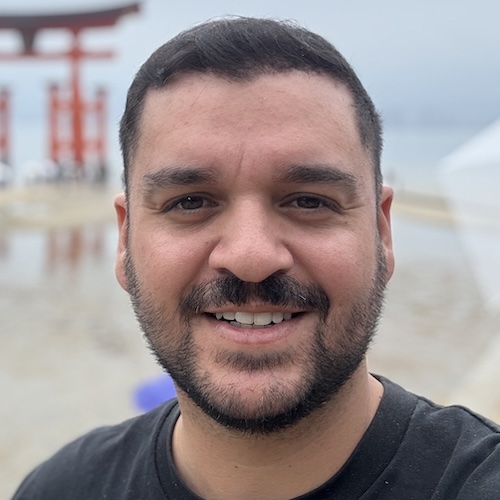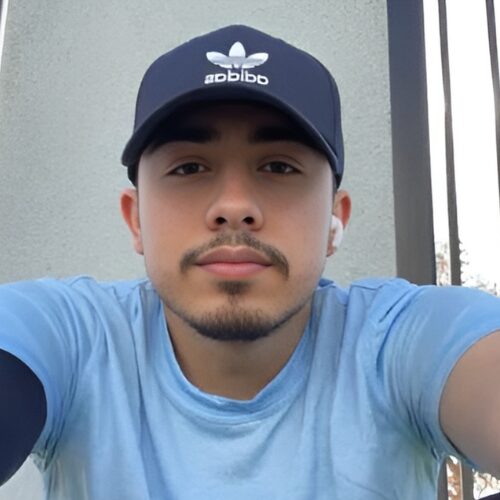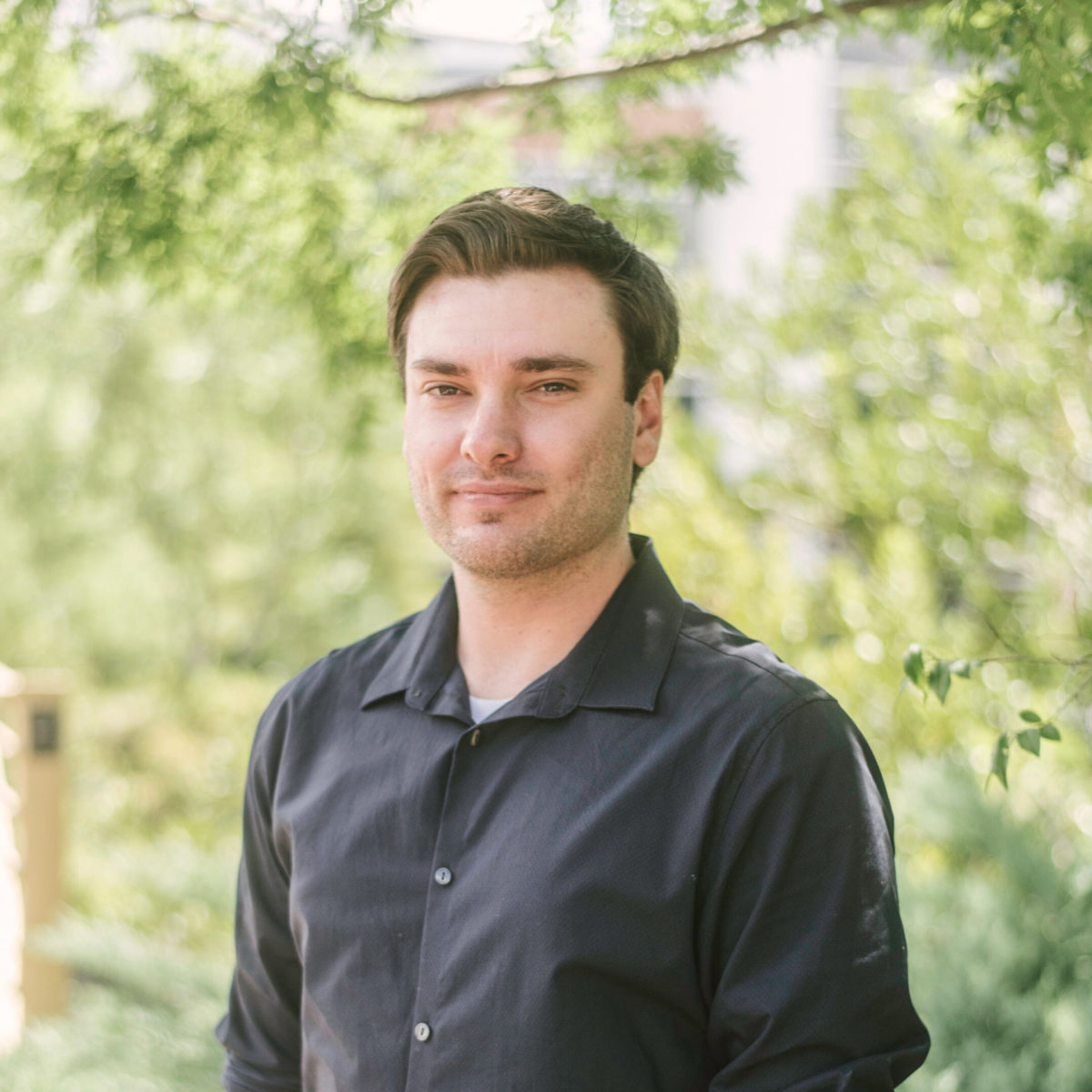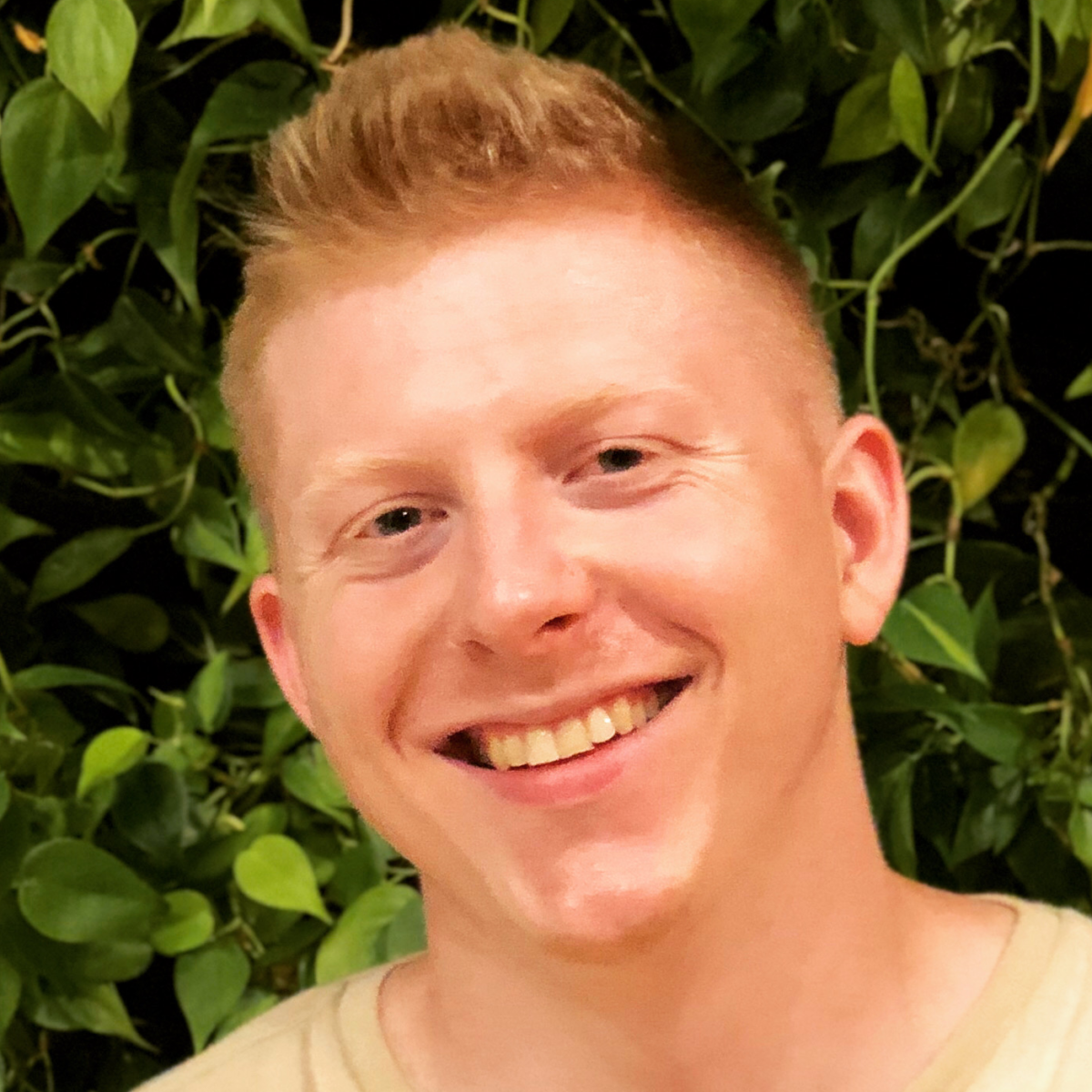Ben’s Metastatic Testicular Cancer Story
At 21 years old, cancer was not on Ben’s mind when he noticed his testicle becoming hard and swollen. 6 months after noticing changes in his testicle, he visited the doctor who scheduled an ultrasound on Ben’s 22nd birthday. Later that same day, Ben was diagnosed with testicular cancer.
As a standup comedian, Ben advocates for testicular cancer awareness through humor and encourages people he meets to get examined when they notice changes in their bodies.
Ben shares his cancer story with us including his experience with reoccurrence, scanxiety, and multiple surgeries, and the importance of sharing cancer awareness.
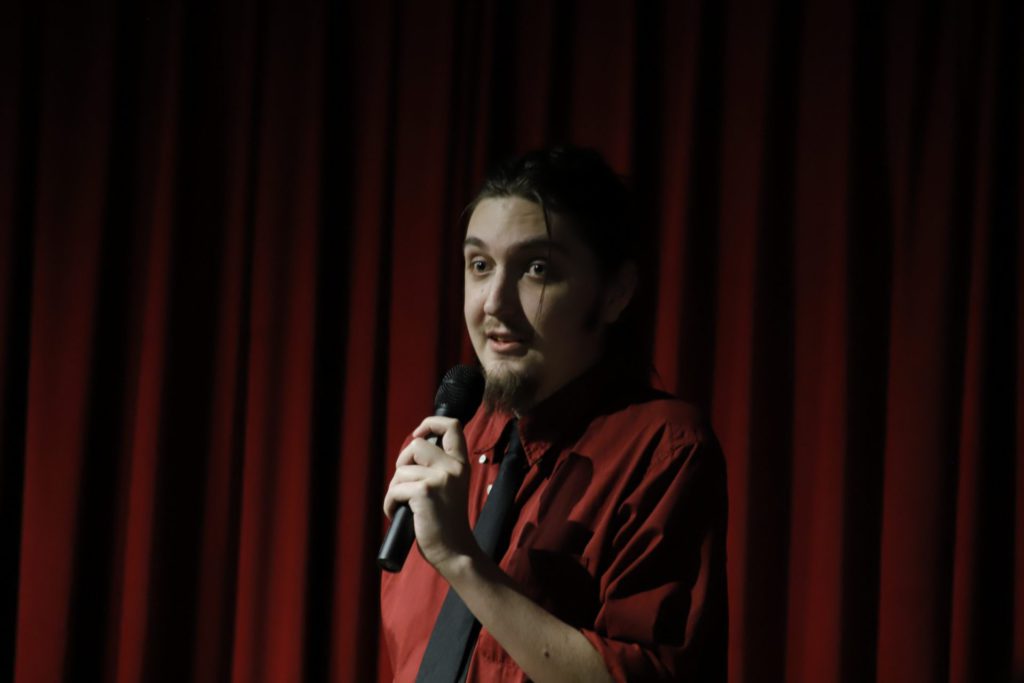
- Name: Ben F.
- Diagnosis (DX):
- Testicular Cancer
- Teratoma
- Metastatic Testicular Cancer
- Tumors in chest
- Testicular Cancer
- Symptoms:
- Hard, swollen testicle
- Age at DX: 22
- Treatment:
- Surgery
- Laparoscopy
- Orchiectomy
- Surgery
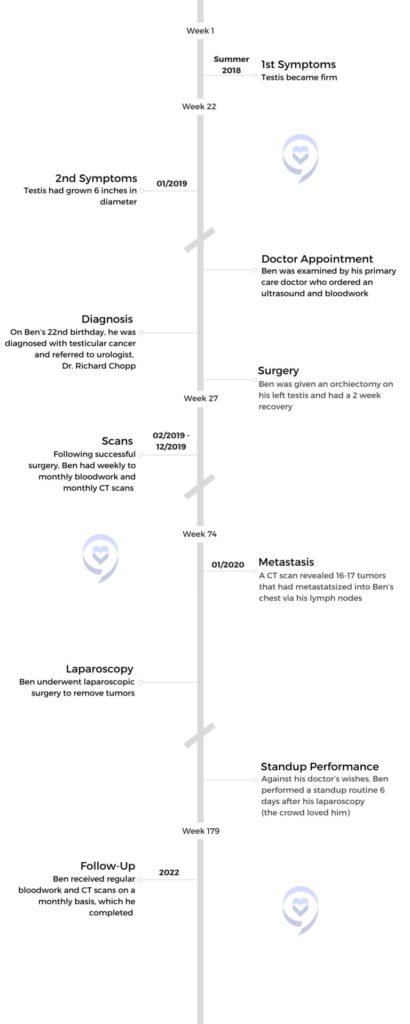
It’s so worth getting stuff checked out when you think something is even a little bit wrong. Waiting is just going to increase your anxiety and ultimately make things worse. Things usually don’t just go away.
Ben F.
This interview has been edited for clarity and length. This is not medical advice. Please consult with your healthcare provider for treatment decisions.
Symptoms & Diagnosis
Tell us about yourself
I noticed that 1 of my testicles got hard out of nowhere. I wrote it off for a whole 6 months. Then it started growing and growing and growing.
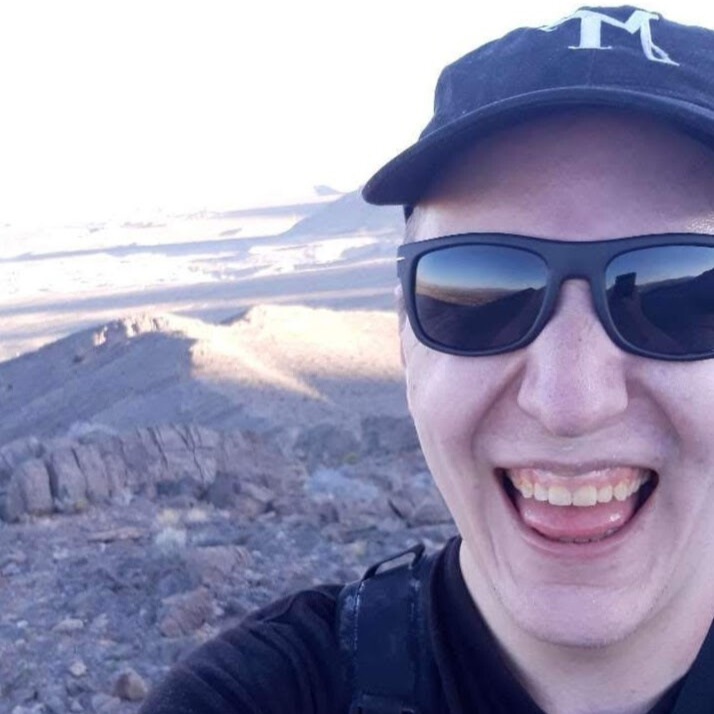
I’m Ben Foede. I’m 26 years old. I’ve been playing drums for 13 years. I bounce out of nightclubs. I do a lot of music stuff in general and some stand-up comedy here and there. I generally enjoy being involved in entertainment.
I try to get out and do at least 1 set a month. I generally work with a production company called Fearless Productions and do Fearless Lab. I do a 10-minute set and just about every time I show up, I’m about to try out some new material. I chat with some of the other comics and I’m like, “I have this one bit that I do about cancer.” I’ll tell them the short version, and they’re like, “You got to do that on stage” every single time.
What were your first symptoms?
When I was living in Texas, I noticed that 1 of my testicles got hard out of nowhere. I wrote it off for a whole 6 months. Then it started growing and growing and growing. My main mode of transportation was bicycle so that became a problem. It got to be almost 6 inches across and 2 pounds. That was the only symptom I ever really had, which was weird. I was like, it can’t be that bad. Then it turned out it was.
I decided to get checked out just on a whim. I was like, I’m tired of having this be a problem. It wasn’t painful, but it was uncomfortable, so let’s go see what’s going on.
I waited 6 months like an idiot because there’s that level of denial that there’s an actual problem. Especially when it comes to your genitalia. It’s embarrassing, it’s frightening and you just don’t want it to be a problem, but it is.
Getting examined & diagnosed
I’m going to set you up with a surgeon. He’s a urologist down here.” I was like, “Okay, what’s his name?” And the doctor said, “His name is Dick Chopp.” I was like, this is the weirdest day of my life.
I went to my doctor and it was my first time with this doctor because I had just moved. That started a cascading effect of eccentric doctors. My doctor competes annually at the beard and mustache championships. In walks this guy with an Alabama accent and giant beard, and he’s like, “Okay, let’s check you out.” I was like, this is weird. He gets a look down there and he’s like, “Alright, we gotta get an ultrasound.” I thought this is continuing to be weird, but this is what’s going to be happening. I don’t have a lot of choices. I’m just getting on this roller coaster. Let’s go.
He schedules me to go to the doctor on my 22nd birthday. I lay down and get my testicle ultrasounded, which is not something that I knew you could even do. Then on the bus ride home, I get a call from my doctor saying, “It’s testicular cancer. You have a massive tumor. I’m going to set you up with a surgeon. He’s a urologist down here.” I was like, “Okay, what’s his name?” And the doctor said, “His name is Dick Chopp.” I was like, this is the weirdest day of my life.
What did you know about testicular cancer prior to your diagnosis?
I knew nothing. Nothing at all. I found out that it usually shows up in your early 20s, which I feel should be talked about more because that’s when people are still stupid because I was. And two, there’s a big family genetic component to it, at least for the specific kind that I had.
I found out 2 months later that there was a family history. It was just never talked about because there’s some weird sense of shame that goes with that. I get that because it’s your genitals, but you need to tell people if it’s running in your family. It’s an important thing to know because if something is even just slightly off, just go get it checked out.
»MORE: Testicular Cancer: A Medical Oncologist Shares Everything You Need to Know
How did you discover testicular cancer ran in your family?
My mom was talking to my grandmother on the phone and my grandma said, “Oh, this person had testicular cancer.” I had a little bit of anger. If I had known, I would have gone sooner. I wouldn’t have waited 6 months and 2 pounds of growth. I probably wouldn’t have it spread to my lymph nodes if I had just gotten it taken care of right away. But I didn’t think that that was even on the table.
Surgery
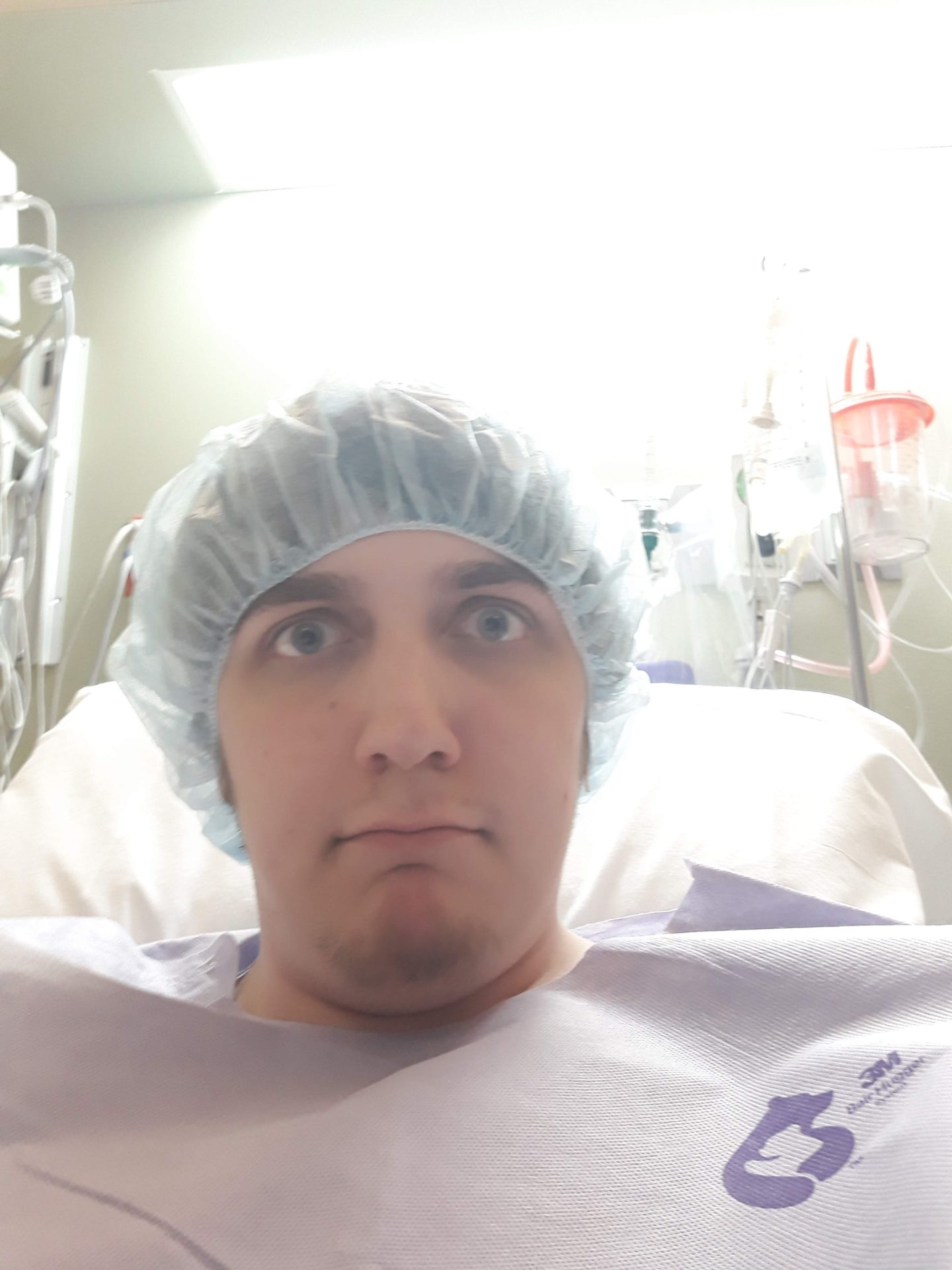
If I had known, I would have gone sooner. I wouldn’t have waited 6 months and 2 pounds of growth.
Describe your surgery
I had a really short conversation where he hooked me up with the urologist and I met him. He was a very nice guy, an older dude. He said, “We’re just gonna yank that right out there and you should be good to go.” It was fairly simple.
Within a week, they put me under and I assumed that it was going to be a cut into the scrotum. Turns out, they got to take out all the plumbing as well. So it’s actually above the genitals where the incision is made.
That surgery was laparoscopic with 5 little holes in my lower abdomen and they took out 16 or 17 little tumors all throughout my chest. Now I have a picture of my insides, which is insane. One of the incisions apparently severs the nerve that flicks the switch between the testicles and the bladder. But laparoscopic surgery is so much easier than you’d think. For the next 2 weeks, you’re definitely not going to want to cough or laugh.
With an orchiectomy, which is removing the testicle, there isn’t a whole lot of prep that goes into it. It is a pretty simple procedure. It’s likely that you’d get a drain put in, so you’d have to come in within the next week again to get that removed. There could be some sutures in a drain. I’m saying that from experience. The nurse was new and in training, and he didn’t realize there were sutures in the drain and just kept on pulling. He was like, “I don’t know why I can’t get it out.” Then the doctor came in and he’s like, “Dude!”
Did your doctors discuss preserving fertility?
The whole time they constantly asked me, “You want to do something in case you want to have kids in the future?” I was like, “Actually I have a strong plan to not have children, so this is convenient.” It wasn’t the first surgery that even made me infertile. It was the second surgery, which wasn’t even on my genitalia.
Describe recovery and follow-up appointments post-surgery
I was back on a bike within 5 days. That surgery was not a problem.
They did the biopsy after the surgery and found, in their words, no testicular tissue visible. That’s when I found out that it was a teratoma. It was an absorbed twin with hair, bone, and flesh tissue. They said that in all likelihood I would not have to go through any chemo because doing an orchiectomy would likely flush my body of the cancerous nature.
Afterward, I was doing blood tests once a week for a month, then twice a month, then once a month, then once every 3 months, then once every 6 months, and some CTS every 6 months, just to be sure. They said, “We’re going to keep an eye on it and see if anything happens,” which ultimately did happen.
They did the biopsy after the surgery and found, in their words, no testicular tissue visible. That’s when I found out that it was a teratoma.
How treatable is testicular cancer?
The thing about testicular cancer, it really shouldn’t be so stigmatized because it is dangerous, but it is also the most treatable kind of cancer. As soon as you hear, “I have cancer,” the first thing you’re going to do is Google – I guarantee – mortality rate. Don’t. Everyone’s an individual. You’re not a statistic, but I obviously did. I looked it up and I compared it to other diseases and it said something like, it has the same mortality rate as pneumonia. I was like, I’ve had pneumonia 3 times. Let’s go.
Did you experience scanxiety?
The first time around, it was a big relief. But I was still on eggshells because they were like, “There’s no cancer but we gotta keep an eye on it.” Going to all those blood tests and taking all those CT scans was a relief, but there was also a good amount of anxiety and paranoia that lasted for well over a year. Then that paranoia wound up being justified.
Going to all those blood tests and taking all those CT scans was a relief, but there was also a good amount of anxiety and paranoia that lasted for well over a year. Then that paranoia wound up being justified.
They said it was a coin flip as to whether or not I would have to go through chemo or have another cancer or go get another surgery. I was spending time with my folks in Las Vegas and they said it was a coin flip. I was like, if there’s anywhere you’re going to take a chance, it’s Las Vegas.
»MORE: Coping With Scanxiety: Advice From Cancer Patients
Reoccurrence
There were 16 tumors in my chest I didn’t feel at all because they were all in that nebulous space in between organs and they were on lymph nodes.
When did doctors discover you had a reoccurrence?
For a year or 2, I was doing the blood tests and the CTs and we were waning down on how often I was doing them. Then the CT comes back and they said, “Yeah, you got some stuff in your chest, including one cherry-sized tumor right there,” which is a scary place to have one.
They scheduled me to go through a laparoscopic surgery because I was firmly against doing chemo if I could avoid it. I’ll do surgeries all you want. I don’t want to go through chemo. That sounds so bad. In hindsight, I probably should have done a couple more months of chemo because I didn’t want to go through that second surgery. But it worked out in the end.
Did you have symptoms with reoccurrence?
I had absolutely no symptoms that second time. I felt nothing whatsoever. There were 16 tumors in my chest I didn’t feel at all because they were all in that nebulous space in between organs and they were on lymph nodes, which I still don’t fully understand. The lymphatic system perplexes me.
The CT scan where they found those tumors was 3 months after the last one I had. Most of them were very small. The one the size of a cherry was the biggest one but they’re going to keep growing if you don’t get rid of them.
How did your cancer reoccurrence develop?
It metastasized from the testicle and into my lymphatic system. A bunch of lymph nodes needed to be yoinked out.
I was talking to my oncologist – I went through about 6 different doctors because I was moving around all over the place throughout all of this. That oncologist said, “The surgery is a very good option. Chemo after the surgery is a good option, but not necessary as long as we keep an eye on it afterward.”
I spent the next 2 years keeping an eye on it. When I finally had my last CT appointment, I was like, it’s over. We’re done.
Did your laparoscopic surgery require any preparation?
Laparoscopic surgery takes a little bit more preparation and effort from patients. They had me go on a hyper-low-fat diet so that my skin was stretchier because they essentially have to blow you up like a balloon, which is horrifying to think of, but cool in practice. One of the incisions has an air tube that’s constantly blowing air so that it can move all the instruments around freely within your chest cavity.
For that, I had to do a month of no fats in my diet whatsoever. That was pretty rough, but ultimately worth it. It made the surgery go quite well. They knock you out and you wake up in a bed and stay there for a couple of days and they make sure that you’re good. I couldn’t eat for 2 days beforehand. It’s not fun but it’s very doable.
How did you feel after your second surgery?
The way that it works is they’re going through your lower abdomen to get up through your chest, so your abdomen is torn up by the nature of the surgery. It hurts pretty dang bad. I sneezed when I was in the hospital, and I started pounding the bed as hard as I could with my fists and my legs. My dad was standing next to me and asked, “You okay?” I was like, “No, my abdomen has been torn up.” It was extremely not fun, but the recovery time doesn’t take that long. I had a month where I couldn’t lift anything above 50 pounds via the doctor’s note, which made balancing work not an option.
Survivorship
His doctor warned him to avoid standup comedy post-surgery
[My doctor] scheduled the surgery 6 days before I was supposed to do a standup show. It was gonna be the first time that I headlined the show. I told my doctor, “Hey, I know I can’t lift anything for a month, but I have this standup show 6 days after. Do you think I could do that?” He said, “Under no circumstances do you do that.” So I did it. I got to say, doing a standup show or just being at a standup show where there are other talented comics, you’re gonna laugh. And laughing when your abdomen is torn up 6 days prior is not ideal. I didn’t tear a stitch, which was awesome, but I feel like it got a little close a couple of times.
That show is definitely the best show I’ve ever done because I told my story about having cancer and how I had Dick Chopp as a doctor, but I left out the part where I got cancer again. Then, I let my head drop right after I did the last joke [and tell them] I still had it and I had 16 tumors in my chest. The audience was so sad for me. Then I said, “That surgery was 6 days ago!” I lifted up my shirt showing off all the new surgical scars that are still a little bit funny. I feel bad for the emotional manipulation but that crowd was very happy at the end of the night.
I told my doctor, “Hey, I know I can’t lift anything for a month, but I have this standup show 6 days after. Do you think I could do that?” He said, “Under no circumstances do you do that.” So I did it.
»MORE: Read More About Cancer Remission
Did humor help you process your diagnosis?
100%. The only way I could process all of that anxiety and terror was through some creative form. As I said earlier, it’s the most curable cancer. It’s as bad as pneumonia, but that doesn’t matter. It’s cancer. You can throw as many mitigating factors as you want onto it. You’re still going to be like, I have cancer. That is an identity that is thrust on you and totally screws with your head for the rest of your life.
I delayed this interview partially because I was having so much anxiety over some lesions on my arms. I was like, great, I got it again. How am I going to tell my cancer story? How am I going to be an advocate? I go to my doctor and he said, “Dude, you got eczema.” He gave me high-power hydrocortisone and my arms are good now. That was 2 weeks ago.
What has your experience with survivorship been like?
After you’ve got the cancer diagnosis, you do not hear horses when you hear hoof beats after you’ve had cancer, you’re only thinking of zebras. Occam’s Razor is very much a problem that you just have to live with and try to logic your way through. But it’s not going to happen because you’ve had this identity thrust upon you that you never wanted, and there’s nothing you can do about that other than try to get better. Afterward, you’re a cancer survivor or you died. There’s nothing you can really do to change. The fact that you have a new identity is such a problem.
At the same time, you wind up making new friends that you never thought you would make. I went to a big box store one day, and the old lady who was a cashier had a really nice breast cancer pen. I told her, “I love your pen.” She said, “I’m actually a survivor myself, 2 times.” I was like, “Oh! Me too, testicular.” We had a big old hug, high-fived each other, and were like, “Yeah!” There’s a positive community that can be developed as long as you find people that you can relate with in this way. If you don’t find people to talk to, you’re just scared and alone forever, and that sucks. Find people. It’s so worth it. Talk to people. Talk to groups. It doesn’t have to be a therapy thing.
After you’ve got the cancer diagnosis, you do not hear horses when you hear hoof beats after you’ve had cancer, you’re only thinking of zebras.
The importance of sharing your cancer story
It’s so worth getting stuff checked out when you think something is even a little bit wrong. Waiting is just going to increase your anxiety and ultimately make things worse. Things usually don’t just go away.
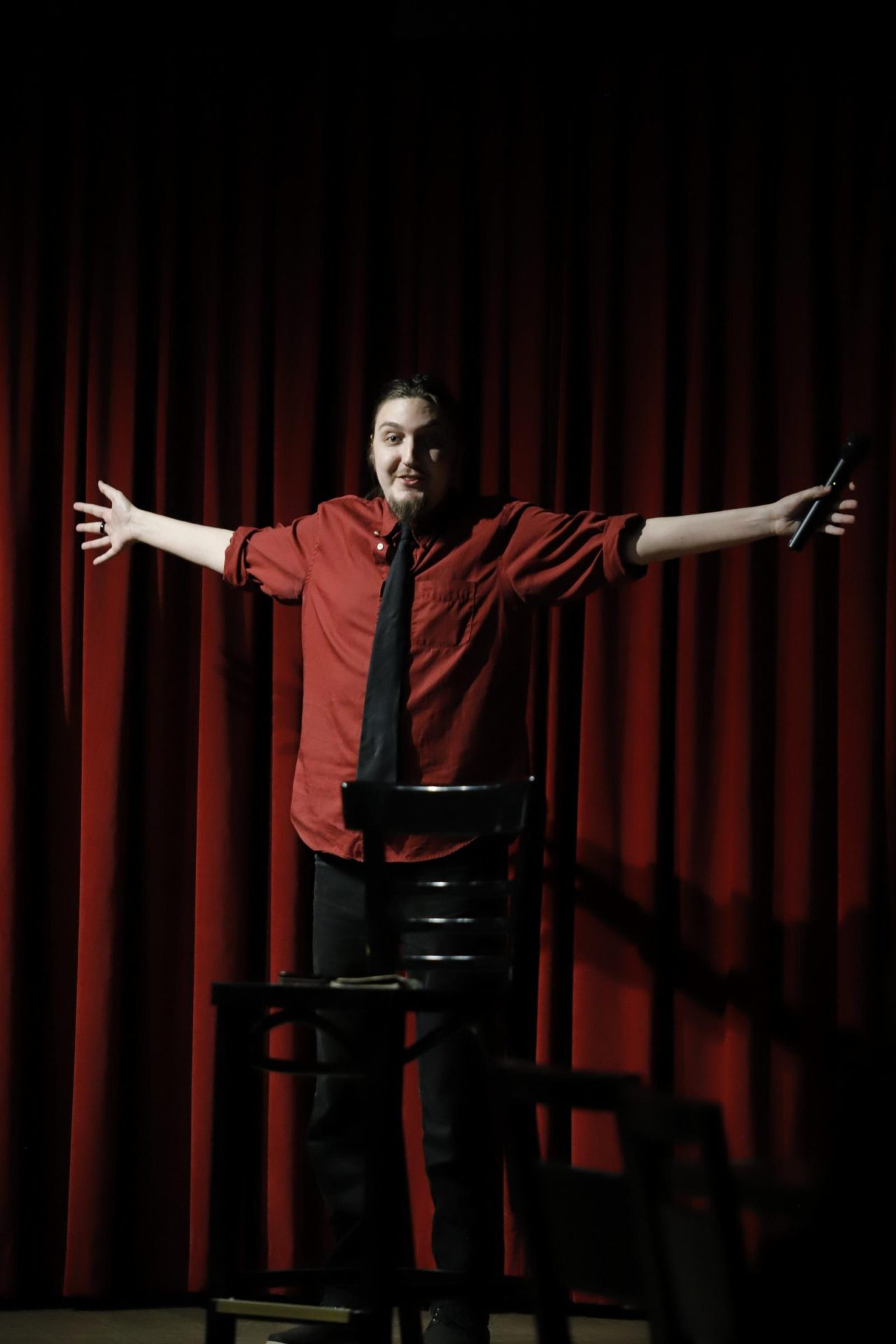
Some of my friends make a joke about it now. Essentially, when I meet new people, I say, “I’m Ben. Do you want to hear about my testicle?” Because I want to talk about it. I want to tell people about it because it’s way more common than people think it is. People don’t talk about it because it’s about genitals, and that’s stupid to me. Everyone’s got it. Not necessarily testicles, but genitals.
I just keep on talking about it. Some of my friends say, “Ben’s meeting a new person. He’s going to talk about his genitals.” I think it is ultimately a funny story, or at least I’ve turned it into a funny story. It’s the best form of advocacy possible – talking directly to someone and saying, “Hey, this is a thing you should know about and get checked on. It’s worth it. It’s so worth it.” I’ve had multiple people go to the doctor just to do a quick screening after talking to me because I thought there was something wrong, but I didn’t do anything about it and I wound up having it twice.
It’s so worth getting stuff checked out when you think something is even a little bit wrong. Waiting is just going to increase your anxiety and ultimately make things worse. Things usually don’t just go away. We like to think that they do, but they go away after you do something. You gotta be active. You got to be an advocate as well. Talk to people and advocate for yourself and for these communities. It’s not worth being quiet because people will ultimately wind up being a detriment to themselves like I was if you’re quiet.
»MORE: Share Your Cancer Story
Reflections
If I hadn’t had a good healthcare team, then maybe I would be able to call myself a cancer survivor, but I am a cancer defeater. I much prefer to stick a middle finger up to cancer instead of being like, “I lived.” No, I killed it.
Do you still get scans?
I’m done getting scans. It’s been a few years. My doctor said, “If something was going to happen, it would have happened by now.” So I don’t have to go in to get scans right now, but if something’s wrong, I’m going to the doctor.
Do you still experience anxiety post-cancer?
I think there was more anxiety when I was getting scans. Every time I would go in once a month or once every 3 months, it would be a day of dread. Like, this is going to be the day that they’re going to say it. But as long as I feel good, as long as I don’t have any symptoms, as long as I actually go to the doctor and get my eczema fixed to not get freaked out, and as long as I take those steps, the anxiety over cancer is gone.
Being a cancer defeater
I call myself a survivor. Or cured, actually. Personally, I don’t like the term cancer survivor. There’s something that bugs me about it. It sounds like I almost died. I didn’t almost die. I had a good healthcare team. If I hadn’t had a good healthcare team, then maybe I would be able to call myself a cancer survivor, but I am a cancer defeater. I much prefer to stick a middle finger up to cancer instead of being like, “I lived.” No, I killed it.
More Testicular Cancer Stories
Matt B., Testicular Cancer (Embryonal Carcinoma, Metastatic)
Symptoms: Severe lower back pain, loss of sensation in left leg, dizziness, fatigue, night sweats, heart complications
Treatments: Surgeries (retroperitoneal lymph node dissection or RPLND, orchiectomy, liver resection, hernia repair surgery), chemotherapy
Josh T., Testicular Cancer, Stage 3A
Symptoms: Pain in his chest, lower back, and abdomen; shortness of breath, especially during exercise; mass found on one testicle
Treatment: Chemotherapy
Steven C., Testicular Cancer (Non-Seminoma), Stage 2B
Symptoms: Enlarged left testicle, tenderness in left testicle, lump in back (retroperitoneum)
Treatments: Surgery (orchiectomy and retroperitoneal lymph node dissection), chemotherapy
Matthew O., Testicular Cancer (Non-Seminoma), Stage 3C
Symptoms: Fatigue, one swollen testicle
Treatments: Chemotherapy, surgery
- 1
- 2
